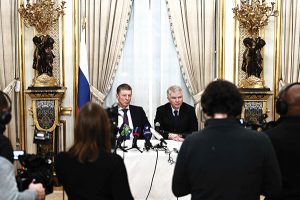Bloomberg
Russia gave a critical initial response to US security proposals aimed at defusing a crisis over Ukraine, saying they failed to address Moscow’s demands to prevent Nato expansion, though the Kremlin indicated talks are likely to continue.
While President Vladimir Putin has read the documents and will take time to study them, “it cannot be said that our views were taken into account, or that a readiness to take our concerns into account was demonstrated,†Kremlin spokesman Dmitry Peskov told reporters Thursday.
“It would be silly to expect a response on the next day,†he said, noting that working-level contacts with the US will continue and talks between Russian Foreign Minister Sergei Lavrov and US Secretary of State Antony Blinken are expected soon. There “aren’t that many grounds for optimism,†given US public statements rejecting Russia’s key demands, though there’s still room to continue dialogue, Peskov said.
The US handed over its response Wednesday to Russia’s demands for binding security guarantees following weeks of intense diplomacy over a buildup of more than 100,000 Russian troops on Ukraine’s border. The US and the European Union have warned of swift and severe sanctions if Russia invades Ukraine. Moscow says there are no plans to attack, though Russia continues to mass forces near the border.
War between Russia and Ukraine would be “unacceptable,†Foreign Ministry spokesman Alexey Zaitsev said Thursday. Citing what he called “a certain lull†in the violence on the front line between Ukrainian forces and Russian-backed separatists in Donbas, he said Moscow hopes for progress at the next round of talks over the conflict in two weeks.
The ruble extended earlier gains against the dollar on his comments, becoming the best performer among emerging markets Thursday, as investors’ fears of conflict eased.
While Blinken said Wednesday the proposals offer a “serious diplomatic path forward†with Russia, the US and the North Atlantic Treaty Organization had already rejected Moscow’s call to ban Ukraine and other ex-Soviet states from future membership of Nato.
They had also dismissed another key demand set out by Russia in draft treaties, that Nato withdraw its forces to positions they held in 1997, before central and eastern European states joined the military alliance.
The U. proposal “allows us to expect the start of a serious conversation but on secondary issues,†Lavrov said, according to the Interfax news service. “On the main question, there’s no positive reaction in this document.â€
Putin “will make the decision on our next moves†once the government completes its review and reports to the president, Lavrov said.
“The situation is moving in a positive direction,†and Lavrov and Blinken may meet next week in Geneva, said Alexey Gromyko, head of the state-run Institute of Europe in Moscow.
 The Gulf Time Newspaper One of the finest business newspapers in the UAE brought to you by our professional writers and editors.
The Gulf Time Newspaper One of the finest business newspapers in the UAE brought to you by our professional writers and editors.
